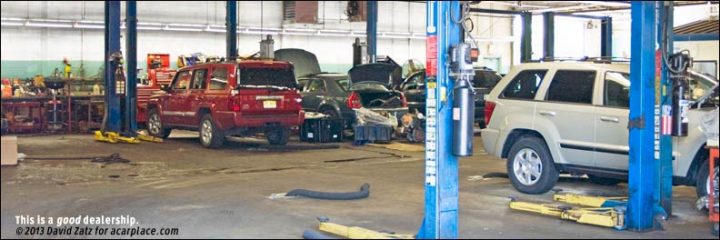
Updated September 2018. Dealers have many ways of making money, and selling cars is just one of them. Today, with manufacturers making warranty work a “loss leader” and Internet sales squeezing price premiums, ripping off existing customers probably seems more attractive to even well-intentioned dealerships.
Let’s start with the humble tune-up. Many dealers still have this set up as “the 24,000 mile service” (or “50,000 mile service” if they’re less greedy). It’s usually not mentioned in your owner’s manual, but since few owners actually check the maintenance intervals, shady dealers don’t have to worry about that. If customers raise the question, they can always point to the “severe service” schedule, regardless of how “severe service” is defined.

Before we go on, let us note that cars are very different now, than in the days of regular tune-ups. Mechanics used to gap or replace points and spark plugs, change rotors and caps, and set engine timing, fuel mixture, float level, and idle speed. Now, we have distributorless ignition, 100,000-mile spark plugs (though not on every car), and electronic fuel injection; there’s usually nothing to adjust, and not much to replace. Even fan belts are self-adjusting.
So why do some shops charge hundreds of dollars for a tune-up, and claim you need them every year or three? What do they do?
What they usually need to do is to adjust the parking brake, and check belts and fluid levels; spark plugs are supposedly good for 100,000 miles on most cars, but should often be changed earlier, at around 80,000 miles (some cars still have less long-lived plugs, too). Many dealers don’t check the parking brake, much less adjust it, at the “xx,000 mile service” or “tune-up;” that’s an added charge.

The actual list of what you or a mechanic needs to do is in your owner’s manual — the best resource. Read the definition of “severe service” carefully, if you have a separate schedule for that.
Some dealers clean out the intake path; others just charge for doing it and keep the chemicals for later use. Regardless, the charge for this is usually very high for spraying a can of solvent which you can buy off the shelf; and it’s usually unnecessary anyway, since all modern fuels have detergents added.
Changing antifreeze and transmission fluid are usually add-on costs. Most cars now have ten year/150,000 mile antifreeze and many have “sealed” transmissions whose fluid is not supposed to be changed, period. (Whether it actually needs to be changed is another story, but it’s unlikely there would be any need before, say, 100,000 miles.)
Our talks with engineers and dealership technicians confirm that little usually needs to be done. The intake rarely needs cleaning, and almost all cars have long-life plugs, antifreeze, transmission fluid, and such. At the same time, many techs we’ve talked to have worked in a place where the advisors charged for work that was never done.
If you have an older car, you may have to replace things — but even then, you can do it yourself and save a bundle. Changing the spark plugs on our car cost under $18 and took about an hour, including figuring out how to do it, buying the plugs, and getting the right size Torx wrench. We only had to do it once in 80,000 miles.
Case study
Let’s look at an example. This comes from a bill from Chrysler of Paramus (DCH), New Jersey. The bill in question was given in August 2001, so adjust for inflation (for example, $467 then was $663 in August 2018). A dealer rep spoke with us, but refused to provide any sort of help to the customer (we keep a copy as evidence). Updated: years later, their Internet sales rep asked us to take down this example, but since the dealership refused to help the original customer, we did not remove it. They did not refute the facts.
The bill for a 60,000 mile service is $467.50 ($663 in 2018 money). That included a “major tune up” (as far as we can tell, replacing the spark plugs, wires, and filters), changing the transmission fluid and filter, ostensibly adjusting the transmission, rotating tires, oil change, lube, front wheel alignment, throttle body cleaning, and rear brake adjustment).
Your local mechanic would probably charge around $340 for this, but there’s more!
Chrysler of Paramus also charged for materials – $13.80 for antifreeze, $10.35 for a valve body filter, $8.28 for an unspecified filter, $13.05 for oil, $4.03 for windshield cleaner ($2 per gallon at NAPA), $10 for “cleaner,” $17.25 for another filter, $65.19 for wires (on a four cylinder engine), $14.28 for four spark plugs (that retail at $2 each), $14 for combustion chamber cleaner, $2.53 for an oil filter, and $51.94 for another unspecified filter. In short, $224.70 in parts.
That puts this dealer service at an actual cost of $692 ($982 in 2018 dollars). The customer was not warned in advance. Who would expect to be charged for an antifreeze topoff or windshield cleaner? Most garages never charge for anything they put in, at least not without asking the customer. Windshield washer is almost always free. Topping off the brake fluid and such is usually free. The grease they use on the doors is free. They don’t charge $4 for half of a $2 bottle of washer fluid.

The guys at Teterboro Chrysler, around 15 minutes away, don’t charge unless they do something. Want them to adjust your self-adjusting rear brakes? I’ve had them do it for free if the car was already on the lift. Need to have your belts inspected? Free.
Was all this stuff even needed? No, but it was “scheduled” — by Chrysler of Paramus (DCH Chrysler). Not by Chrysler itself.
The last little stinger? The car, a 2.4 liter minivan, had been through a similar 30,000 mile service and was not driven on “Severe Duty.” By the manufacturer’s schedule, the cost should have been $30.
Overpriced, shoddy work
Then we get to the repairs you really need – things like brakes and clutches. One family actually spent over $1,000 to have a clutch replaced at Dodge of Paramus (now merged with Chrysler of Paramus). It had to be done again a few months later; the second mechanics, who re-did the job for less than half the price, said the dealership failed to install the clutch correctly.
There are others pulling the same scams. For example, a Volvo dealer did the same sort of scheduled maintenance trick on a Volvo, and told the owner that there was nothing wrong despite constant stalling. The same dealer told the owner that they could not check the computer because it was too old. If they had checked the computer, they would not have been able to swap out a long, expensive series of parts, because a single, inexpensive sensor was at fault. Like the computer in every car since the 1990s, it did store fault codes — including the one that would have told the dealer exactly what was wrong — and was easy to read with cheap aftermarket gear that the dealership surely had.
Oil changes
Most dealers want you to change your oil every 3,000 miles. Many modern cars have oil change computers which monitor your driving and the engine temperature, and tell you when to change the oil — usually, at anywhere from 6,000 to 10,000 miles. Who is right? The guys who designed your car and ran thousands of hours of test studies and analysis, or the guys who make money every time you show up?

Modern cars usually tell you when they need an oil change, and it’s rarely every 3,000 miles.
Even back in the 1990s, some companies had extended their oil changes to six months or 7,500 miles. Today, it’s often “at least once a year or every 10,000 miles” and more often “within 500 miles of the computer telling you to change the oil,” which works out about the same. How could they do that? Largely, through better quality oils. Today, any SAE-rated oil is likely to be nearly as good quality as synthetic was when it was first introduced. Oils are less viscous when cold, more viscous when hot. Engines have changed, too; they are better sealed, so thinner oils can be used, and there are fewer “hot spots” to burn the oil. Don’t stick with 1950s wisdom on a 2019 car.
Implications for action
Stories like this abound. Here is our advice:
1) Don’t trust the dealer or mechanic blindly. If this happens to you, complain. Seek out their Facebook page and tell your story there. Go to state authoritie and the automaker itself — which does care, even if they are often powerless.
2) Only have the maintenance recommended by the factory unless you have special circumstances. Make copies of the owner’s manual pages with the service intervals, and follow them. Cars require far less maintenance than they used to and many dealers haven’t changed their “requirements.” It may save you thousands of dollars over the life of your car.
ALSO SEE: Hidden warranties • Having problems with dealers or garages?

David Zatz has been writing about cars and trucks since the early 1990s, including books on the Dodge Viper, classic Jeeps, and Chrysler minivans. He also writes on organizational development and business at toolpack.com and covers Mac statistics software at macstats.org. David has been quoted by the New York Times, the Daily Telegraph, the Detroit News, and USA Today.

I just took my 2018 Chevy Tahoe in for the 30,000 mile service at the dealership. Holy mackerel! I wish I had read this BEFORE i went in. $2200
I just took in my vehicle for the 60,000 mile service at local dealership where I bought it from,Holy mackerel!!! I have 2014 Chevy Impala that has 2.5 liter engine that a 4 Cylinder car. I wish I had read this BEFORE i went in. After owe about close to $1100.00 later just wow and they wonder why we don’t go back to dealership.. Who has a 1100.00 just laying arnd or in bank.. Not me guess am in wrong business if you just got money like tht. More power to you about money.. Good luck on your maintenance whoever does it next at their local dealership..
I drive my 2014 Ford, less than 6k miles in six months, but I do have my oil changed, my tires rotated, all tire pressures (including the spare) written on the work order receipt, and fluids topped off every six months, no matter what. I take good care of my car. I was told by the dealer rep. that at my next oil change, I should have my 60k tuneup. They will ONLY charge me a minimum of about $1,000! Thank you for the heads up. I will be checking my owners’ manual, for servicing that truly needs to be done and when.